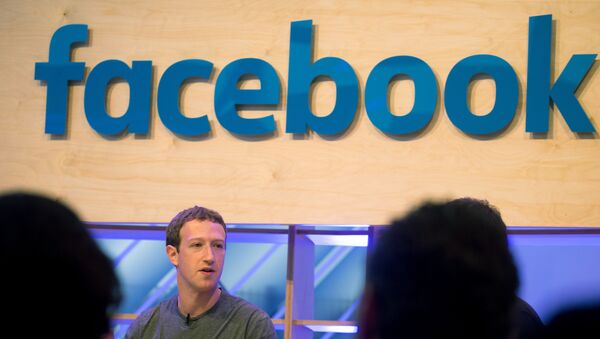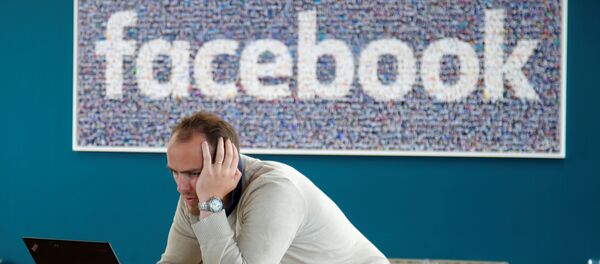Sputnik: Facebook has been coming under fire for awhile now due to privacy concerns, why do you think the firm decided to publicize the mistake?
Paul Levy: I think the thing that is of concern on this one is that when the story broke it was a week after the breach of the bug had actually happened and that suggests that Facebook isn't really in control of its own social media, necessarily, because a week went by and only then we have found out about it.
Sputnik: Do you think they're not in control or do you think they are perhaps covering it up and then somebody sort of leaked it and then they had to make it known?
READ MORE: Facebook, Google Sued Over Failure to Disclose Data on Political Ads
Paul Levy: It could be a mix of both, there a lots of conspiracy theories about cover ups, but I would think that these systems now have become so complex, they actually display chaotic properties. We're talking about billions of users and in recent months Facebook was having to hurry to get all these privacy controls in place, and my suggestion would be that these large corporations don't really understand their our own systems well enough, so they discover the bugs when they go public.
Sputnik: Do you think that this is really going to affect Facebook, though?
Paul Levy: I think it is dangerous but it's really easy to keep blaming Facebook as they're big enough to take the blame, but it's also showing how passive many users have become because even with new Facebook privacy controls you will find soon that a lot of individuals haven't even bothered to access them, people just want them immediate gratification of getting online so people could like their posts.
I think you'll find a lot of this has gone through because in this particular case if people had been really proactive they might've been able to find that this has happened but very few people actually tend to be looking. We tend to go online, we tend to be very passive with our privacy, certainly in large numbers, so Facebook is offering a free service here in terms of their own cost. Obviously there's a real cost here when we allow our data to be used for targeted advertising, and I think the problem here is also that we have to wise up, we have to teach our children to be much more aware of what privacy means, particularly when that privacy is broken in a glitch like this.
Sputnik: The social media platform said that it's going to be more transparent about its product and privacy settings, could this be part of that change?
Paul Levy: I think it's totally part of that change, but I come back to the previous point again, let's say they're totally transparent and we are given control over that privacy, are we going to take it? Because looking after your social media garden requires you to do some weeding yourself, and it requires you to be a bit more active. We protect our houses so that we don't get broken into, we don't tell people our private information when we're out and about in coffee shops and with friends, yet that's exactly what a lot of people are doing on social media, so Facebook will go very transparent because it has to, but I still worry about how we're educating our young so they realize the value the importance of privacy.
READ MORE: Facebook Reported to Have Handed Users' Private Data Over to 60 Device Makers
It's not the same as secrecy, privacy is about having those things that are raelly important to you and in your life private when you chose them to be, just as you're allowed to have your own secret, private thoughts if you want to, and I think we are all becoming a bit lazy with this stuff.
Sputnik: Do you think that anybody would actually bother suing Facebook over this? Do you think there could be a basis for a nice little lawsuit?
Paul Levy: There has to be a lawsuit, particularly, if this breach has led, for example, to private conversations going public and has led to measurable loss or damage to those individuals.
The question becomes very similar to when you check-in to a hotel and then put your money in the safe where the hotel has this small print and they put a big print up saying that you're staying at this hotel at your own risk and your valuables are at your own risk, small print in lots of social media sites try to say the same thing, and the question that will be in court is to what extent will the judges come down on the side of the small person or the individual and to what extent will they say: 'Well, you know, this is fair game, you decided to go onto this platform, you knew the risks there are bound to be in a reasonable sense, mistakes happen in such complex systems.' And which way will the judges go? Sometimes they go in favor of the individual but quite often it's the corporation that walks off scott free.
Sputnik: Does Facebook really have small print which says that we're not responsible for your security, do they have that? I'm just wondering, they're saying that they're going to make things secure, they have this setting which some people have chosen to use which makes things visible only to friends or to people that they allowed to see?
If it did come in favor of you and me as a consumer this would cost billions and billions as a precedent, and I'm not sure that's going to happen because of the sheer cost of everyone taking these companies to court, so in an ideal sense we ought to be holding these companies legally accountable, but it's not really happening yet.
Sputnik: Facebook is very popular and you can't say that even after the big scandals they have a huge fall in the number of people who are on Facebook?
Paul Levy: We've got numbers in the US, and I think there was a number like: the more older demographic has been leaving Facebook, the younger people have been leaving it more too, they've been moving on to other social media platforms like Instagram and Snapchat which may be suffering from the same problems sooner or later as well. So people are leaving round it's definitely a sign of an increased mistrust of these organizations using our data ethically and also being not able to safeguard our data, which is what they should do, so in the longrun we could notice a departure from these platforms, but in the long run I also have doubts because these services are being offered free of charge and lots and lots of people are becoming addicted to them.
The views and opinions expressed by the contributors do not necessarily reflect those of Sputnik.




